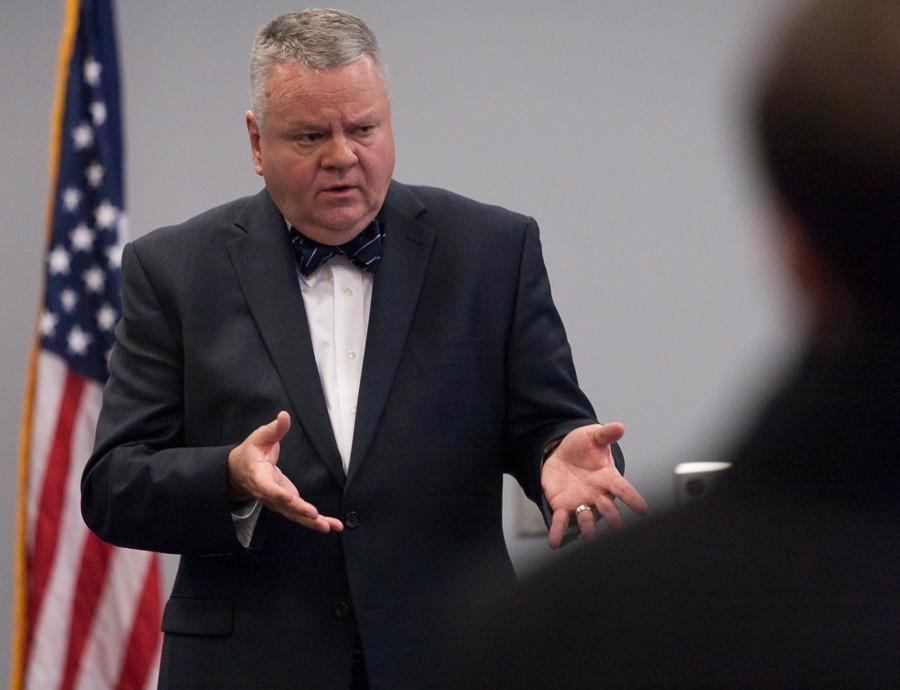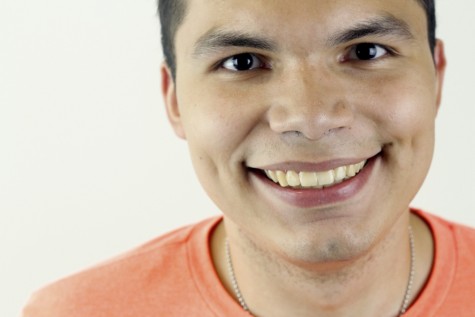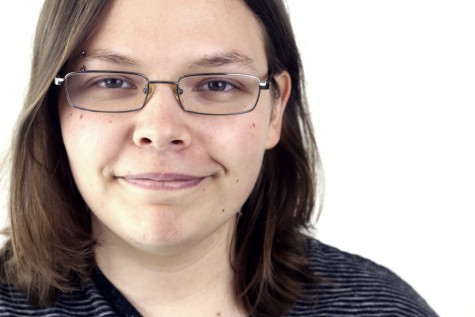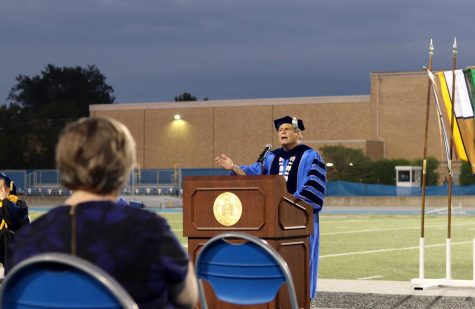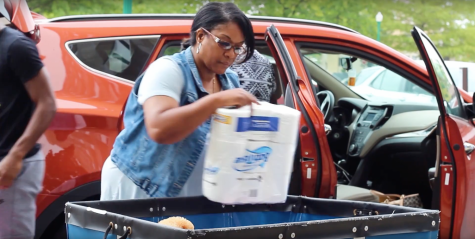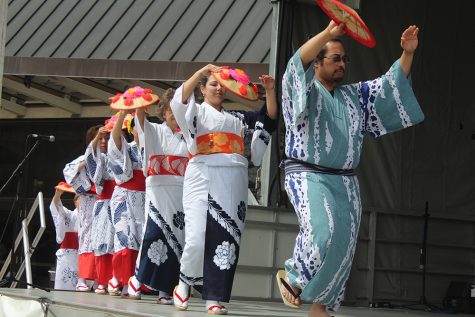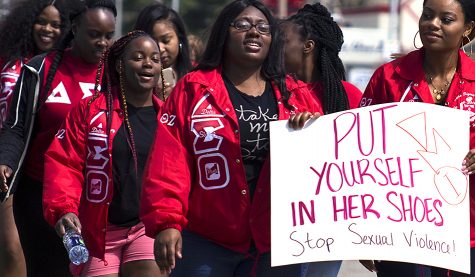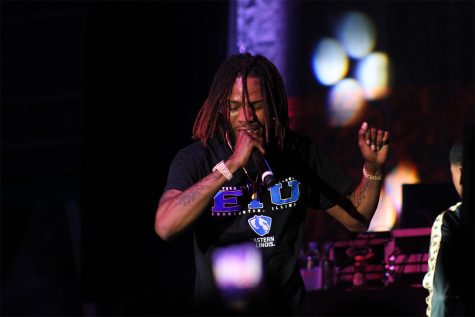Third presidential finalist shares experience, goals
Eastern presidential finalist Sam Minner talks with students during the open student forum on Friday in the Arcola/Tuscola Room of the Martin Luther King Jr. University Union. Minner held an informal discussion with students, talking about aspects of his personal life and qualities that he would bring to Eastern, should he be selected president.
January 25, 2015
Sam Minner, the provost and vice president for academic affairs at Radford University in Virginia, was the third of four presidential finalists to speak before the faculty, staff, students and community of Eastern in open interview forums Friday.
Minner was a dean for Truman State University for seven years. Before that, he was a professor at East Tennessee State University and a department chair at Northern Arizona University.
Minner has also done some work aboard in Kenya, South Africa, the U.K., and most notably in Central America.
“When I was in Belize, I was a member of a small team of U.S. academics that assisted the government there in Belize to establish their first university,” Minner said.
Minner also said he wrote millions of dollars in grants to help bring education to Native American tribes in Arizona.
Minner has a bachelor’s degree in elementary and special education and a master’s degree in learning and behavior disorders from Southern Illinois University-Edwardsville, and he has a doctorate degree in cognitive and behavioral disabilities from the University of Arizona-Tucson.
He was born and raised in Illinois and is a first generation college student.
Zack Samples, a graduate student in the college of student affairs, asked Minner what would be the first issues on campus he would give his attention to.
Minner said he would address the declining enrollment and work on promoting competitive advantages and improving academic outcomes.
“This job, the goals are pretty straightforward—to protect the institution’s viability, to make sure things stay solid, and beyond that, it’s to increase vitality, to improve,” Minner said. “So first and foremost, let’s do everything we can to get our sources of revenue up to where they need to be. That’s mainly though enrollment; 60 percent of your revenue approximately is through tuition.”
Minner said he believes his personal characteristics and experience make him a good match for Eastern, and he needs no convincing that it would be a worthwhile place to devote his time.
“I’ve got a good record of increasing enrollment,” he said. “We’ve increased enrollment at Radford since I’ve been here; we’ve added programs that significantly added to the ethnic minority enrollment and first generation enrollment.”
Minner said he and his team at Radford University have increased ethnic minority enrollment by 81 percent and first generation enrollment by 40 percent.
He said to improve the minority enrollment at Eastern, he would look at what the university is doing to retain certain populations, citing the growing number of Hispanic students as an example.
“Are we doing anything in that regard?” Miner asked. “Are any of our promotional materials in Spanish? Do any of our recruiters speak Spanish? Have we thought through our recruitment activities in relation to some of the interests of Hispanic students?”
Minner added that he is a critical theorist and studies the use and distribution of power in social contexts.
He said in his current job, he chooses a member of the faculty or staff who is in an underrepresented group in higher education each semester and gives them an office near his, talks to them about leadership challenges and sends them to professional development opportunities.
“I want to help diversify the pool of leaders in our sector,” Minner said.
Dagni Bredensen, an English professor and director of faculty development, asked about the retention of minority faculty.
Minner said he has increased the number of ethnic minority faculty by paying closer attention to recruiting them and making them feel welcome in the community.
Reggie Thedford, the student body president, asked Minner what his interaction with students would be like.
Minner said he tries to have as much face-to-face interaction with students as possible; at Radford University, this includes eating in the dining halls, having students over for dinner, teaching classes and mentoring students who might have certain challenges getting in the way of their potential.
David Smith, a history professor, wanted to know how Minner would approach what Smith and several of his colleges call a lack of leadership among the senior administration.
“It is my belief that in 2015, maybe beyond that, that outcomes in any organization, particularly organizations like ours, are very much a function of and tied to the team,” Minner said. “That team has got to be strong, when a door closes I want to hear from that team, what they think, not a yes or no.”
Fern Kory, an English professor, asked Minner what his thoughts were in regards to the crisis in higher education.
“The number of high school students in the United States is decreasing, and it’s going to continue to decrease for a while people think,” Minner said.
Minner also said people can no longer afford to wait around for students to apply, and after a certain number say that’s it.
“That is a failed strategy, it’s failed already and that puts the institutions at risk,” Minner said. “That’s coupled with another variable which is diminishing support from state government.”
Minner has been involved with the Board of Commissioners, a distribution committee in charge of giving out grants, and the Missouri Foundation for Health.
He has also been involved in his community as an active election official, working in voting polls, taking part in food pantries and issues related to education and animals.
“You can’t just sit in your office. People in higher education should be model-engaged citizens,” Minner said. “The president of an institution and others, have to be active and engaged members of the community.”
Shavon Francis, a senior accounting major, asked Minner to give an example of some ethical dilemmas he has faced in his career.
Minner said waiting for him on his desk when he returns to Radford University is a case in which several female students have accused a tenured faculty member with an otherwise clean record, a doctorate degree and various teaching awards of sexual harassment.
“He alleges that this is absolutely untrue; it’s going to be up to me to make that decision, and I have a lot of latitude,” Minner said. “I can say nothing’s going to happen; I can say you’re done here and he will never get another academic job.”
Minner said he has to be careful and objective in the situation because he recognizes the impact his decision will have on the lives of the people involved.
“You can’t go into those decisions with any set ideological position,” he said. “You just have to look at what really happened.”
Rocken Roll, a graduate student in the College of Student Affairs, asked Minner what stood out to him about Eastern.
Minner said he was impressed with Eastern’s campus as well as the ethos and spirit of the students and faculty.
“I really enjoyed meeting your president,” he said. “I think he’s a great guy, and it’s going to be a hard act to follow in my view should I advance in the search.”
Luis Martinez, Stephanie Markham and Debby Hernandez can be reached at 581-2812 or [email protected].






































